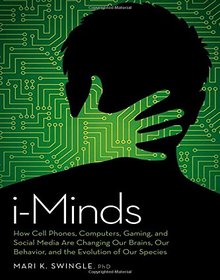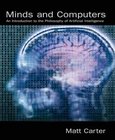I-Minds
How Cell Phones, Computers, Gaming and Social Media are Changing Our Brains, Our Behavior and the Evolution of Our Species

Book Details:
| Publisher: | New Society Publishers |
| Series: | MIX |
| Author: | Mari Swingle |
| Edition: | 1 |
| ISBN-10: | 0865718253 |
| ISBN-13: | 9780865718258 |
| Pages: | 240 |
| Published: | Jun 30 2016 |
| Posted: | Mar 21 2017 |
| Language: | English |
| Book format: | |
| Book size: | 2.22 MB |
Book Description:
Many of us would no more go out without our cell phone than we would leave the house without clothes. We live our lives on social media, and PDAs, tablets, computers and other devices are completely integrated into our global culture. From connectedness to accessibility and instant access to information, a wealth of benefits accompanies this digital revolution. But what about the cost? Weaving together history, popular literature, media and industry hype, sociology and psychology, and observations from over eighteen years of clinical practice and research, Dr. Mari Swingle explores the pervasive influence of i-technology. Engaging and entertaining yet scientifically rigorous, i-Minds demonstrates: How constant connectivity is rapidly changing our brains What dangers are posed to children and adults alike in this brave new world The positive steps we can take to embrace new technology while protecting our well-being and steering our future in a more human direction This extraordinary book is a virtually indispensable look at a revolution where the only constant is change-food for thought about which aspects of technology we should embrace, what we should unequivocally reject, and the many facets of the digital era that we should now be debating. Dr. Mari K. Swingle is a neurotherapist and behavioral specialist who practices at the highly-regarded Swingle Clinic. She holds a BA in Visual Arts, an MA in language education, and an MA and PhD in clinical psychology, and has won numerous awards for her post-doctoral work on the effects of i-technology on brain function.
Download Link:
Related Books:
Kepler's Conjecture
How Some of the Greatest Minds in History Helped Solve One of the Oldest Math Problems in the World
The fascinating story of a problem that perplexed mathematicians for nearly 400 yearsIn 1611, Johannes Kepler proposed that the best way to pack spheres as densely as possible was to pile them up in the same way that grocers stack oranges or tomatoes. This proposition, known as Kepler's Conjecture, seemed obvious to everyone except mathematicians, who seldom take anyone's word for anything. In the tradition of Fermat's Enigma, George Szpiro shows how the problem engaged and stymied many men of genius over the centuries--Sir Walter Raleigh, astronomer Tycho Brahe, Sir Isaac Newton, mathematicians C. F. Gauss and David Hilbert, and R. Buckminster Fuller, to name a few--until Thomas Hales of the University of Michigan submitted what seems to be a defini...
Arduino and Kinect Projects
Design, Build, Blow Their Minds
If you've done some Arduino tinkering and wondered how you could incorporate the Kinector the other way aroundthen this book is for you. The authors of Arduino and Kinect Projects will show you how to create 10 amazing, creative projects, from simple to complex. You'll also find out how to incorporate Processing in your project designa language very similar to the Arduino language. The ten projects are carefully designed to build on your skills at every step. Starting with the Arduino and Kinect equivalent of "Hello, World," the authors will take you through a diverse range of projects that showcasethe huge range of possibilities that open up when Kinect and Arduino are combined. Gesture-based Remote Control. Control devices and home ap...
Minds and Computers
An Introduction to the Philosophy of Artificial Intelligence
Could a computer have a mind? What kind of machine would this be? Exactly what do we mean by 'mind' anyway?The notion of the 'intelligent' machine, whilst continuing to feature in numerous entertaining and frightening fictions, has also been the focus of a serious and dedicated research tradition. Reflecting on these fictions, and on the research tradition that pursues 'Artificial Intelligence', raises a number of vexing philosophical issues. Minds and Computers introduces readers to these issues by offering an engaging, coherent, and highly approachable interdisciplinary introduction to the Philosophy of Artificial Intelligence.Readers are presented with introductory material from each of the disciplines which constitute Cognitive Science: Philosoph...
2007 - 2021 © eBooks-IT.org



